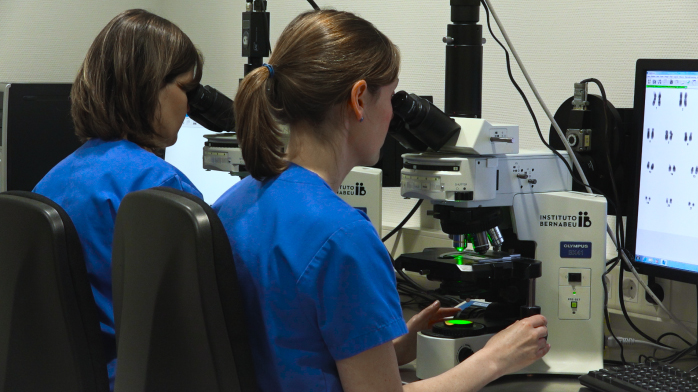
IBGen RIF: a genetics test for detecting recurrent pregnancy loss and implantation failure
Instituto Bernabeu has managed to determine which genes cause recurrent pregnancy loss and implantation failure. The findings are the result of four years of research and the clinic’s commitment to helping patients who suffer from infertility issues of this kind. These problems are incredibly frustrating for the people who suffer from them. The findings have opened up a door of hope for women who, for apparently no particular reason, suffer from early pregnancy loss or in whom embryos do not implant in the uterus. The importance of the progress made by the reproductive medicine clinic has been addressed in one of the world’s leading specialist journals: Human Fertility. In its October edition, the journal published the research work revealing the findings made by Instituto Bernabeu scientists. The research involved identification of the genes involved in issues of this kind.
The reproductive medicine clinic has used the findings to develop the IBGen RIF test, an in-house genetics test that analyses if there is a genetic cause related to reproduction issues in women who suffer from implantation failure and recurrent pregnancy loss. It can be used to provide these women with an improved prognosis and to design personalised courses of treatment aimed at improving their chances of pregnancy. “The results of this test provide experts with additional data in their quest to find a suitable course of treatment when this is medically possible and there is a pharmacological means of improving or resolving the issue”, explains Dr Belén Lledó, an expert in molecular biology and Scientific Director of the Genetics Department at IB Biotech.
The IBGen RIF test analyses variants in the genes involved in correct embryo implantation and development of pregnancies. These include the genes linked to thrombotic risk (prothrombin, factor V Leiden and MTFHR), along with immunological factors (IL-11 and APOE) and factors that modulate endometrial receptivity (p53 and VEGF).
The test is very simple since the only biological material that is required is a sample of the patient’s saliva or blood. Based on this information, the genetics laboratory at IB Biotech analyses the sample to extract DNA that is then used to study the seven genetic variants associated with implantation failure and recurrent pregnancy loss.
At least 50% of cases of implantation failure and recurrent spontaneous pregnancy losses are caused by genetic, anatomical, endocrine and autoimmunity issues. However, an elevated number have no known cause. Dr Lledó highlights the importance of this test that puts patients at an advantage. It offers them improved prognoses since the study includes genetic variants that have previously been taken into account.
IBGen RIF is an addition to IBGen IVF, the highly useful discovery made by Instituto Bernabeu that has facilitated treatment of poor ovarian reserve since 2016. It makes matching medication to each patient’s genetic profile possible. The IBGen IVF test makes improving ovarian response possible during in vitro fertilisation treatment.
Since this issue is so important, Instituto Bernabeu has a specific, interdisciplinary unit that studies implantation failure and recurrent pregnancy loss. The unit is managed by Dr Rafael Bernabeu, Medical Director at Instituto Bernabeu
